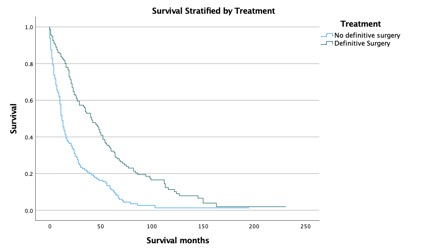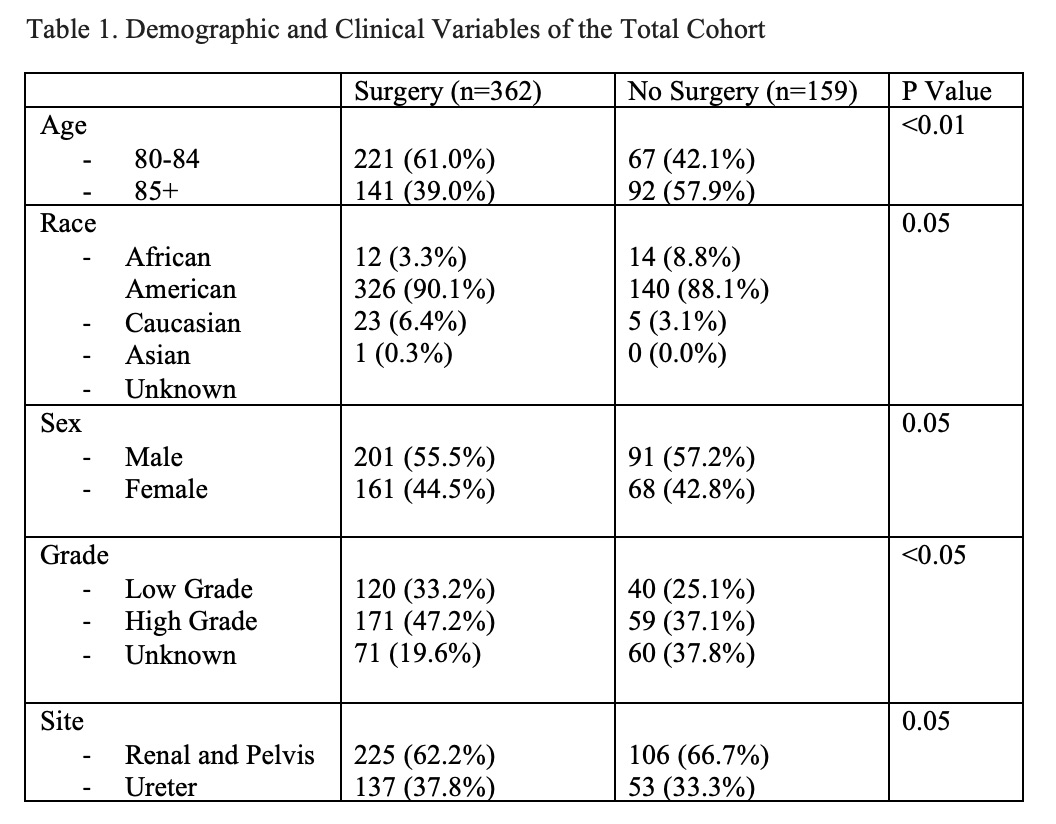Back
Poster, Podium & Video Sessions
Moderated Poster
MP40: Bladder Cancer: Upper Tract Transitional Cell Carcinoma I
MP40-14: Overall Survival Among Elderly Patients with Localized Upper Tract Urothelial Carcinoma Receiving Observation Versus Definitive Treatment
Sunday, May 15, 2022
8:45 AM – 10:00 AM
Location: Room 225
Syed Rahman*, Jamil Syed, Soum Lokeshwar, Benjamin Press, New Haven, CT, Thomas Monaghan, Dallas, TX, Michael Leapman, New Haven, CT
- SR
Syed Rahman, MD,BS
Yale New Haven Hospital
Poster Presenter(s)
Introduction: Treatment decisions regarding elderly patients with upper tract urothelial carcinoma (UTUC) can be challenging given competing risks associated with age and comorbidities. Herein we assess survival outcomes among patients 80+ years diagnosed with clinically localized UTUC managed with definitive surgery versus expectant management.
Methods: We utilized the Surveillance, Epidemiology, and End Results (SEER) database (2004-2015) to identify individuals 80 years of age diagnosed with localized (cT1-4N0M0), kidney/renal pelvis and ureteral urothelial carcinoma. Survival analysis included Kaplan-Meier analysis and multivariable Cox proportional hazard analysis with adjustment of demographic and clinical variables.
Results: We identified 521 individuals with localized UTUC 80+ years of age. 159 patients (29.1%) did not receive definitive surgery and 362 patients (70.9%) received surgery. Patients managed expectantly were older (57.9% vs. 39.0% >85 years, p<0.01) and more commonly had high grade tumors (47.2% vs. 37.1%, p<0.05). Median OS was significantly higher in the surgical cohort (45.3 months vs 18.5 months, p<0.001). The 3-year disease specific survival (DSS) was lower in the non-surgical cohort, (39.6% months vs. 53.0%, p<0.001). Overall, surgery was associated with improved OS compared to non-surgical management in patients >80 years of age (HR 0.53 [0.42-0.69, p<0.001). Age >85 years (HR 1.63 [1.34-1.93], p<0.001) and high grade (HR 1.22 [1.06-1.31] p<0.05).
Conclusions: Among patients =80 years with localized UTUC, initial definitive surgery was associated with improved OS, which may reflect candidate selection for definitive treatment. These findings highlight the need for improved decision support about definitive treatment for older patients with genitourinary malignancies.
Source of Funding: None


Methods: We utilized the Surveillance, Epidemiology, and End Results (SEER) database (2004-2015) to identify individuals 80 years of age diagnosed with localized (cT1-4N0M0), kidney/renal pelvis and ureteral urothelial carcinoma. Survival analysis included Kaplan-Meier analysis and multivariable Cox proportional hazard analysis with adjustment of demographic and clinical variables.
Results: We identified 521 individuals with localized UTUC 80+ years of age. 159 patients (29.1%) did not receive definitive surgery and 362 patients (70.9%) received surgery. Patients managed expectantly were older (57.9% vs. 39.0% >85 years, p<0.01) and more commonly had high grade tumors (47.2% vs. 37.1%, p<0.05). Median OS was significantly higher in the surgical cohort (45.3 months vs 18.5 months, p<0.001). The 3-year disease specific survival (DSS) was lower in the non-surgical cohort, (39.6% months vs. 53.0%, p<0.001). Overall, surgery was associated with improved OS compared to non-surgical management in patients >80 years of age (HR 0.53 [0.42-0.69, p<0.001). Age >85 years (HR 1.63 [1.34-1.93], p<0.001) and high grade (HR 1.22 [1.06-1.31] p<0.05).
Conclusions: Among patients =80 years with localized UTUC, initial definitive surgery was associated with improved OS, which may reflect candidate selection for definitive treatment. These findings highlight the need for improved decision support about definitive treatment for older patients with genitourinary malignancies.
Source of Funding: None



.jpg)
.jpg)